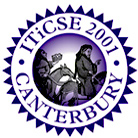
Home
| About
ITiCSE 2001| Host |
Program
| Monday 25th | Tuesday 26th | Wednesday 27th | ||||
|
09.00-10.00
|
Welcome & Invited Speaker
(Cindy Atman) |
Invited Speaker
(Les Hatton) |
Invited Speaker
(John Slater) |
|||
|
10.00-10.45
|
||||||
|
10.45-12.15
|
||||||
|
HCI & Hypermedia
|
Teaching & Learning
|
Learning & Teaching
|
Visualisation & Animation
|
Distance Learning & Collaboration
|
Tips & Techniques
|
|
|
12.15-13.30
|
Lunch
|
Lunch
|
Lunch
|
|||
|
13.30-15.00
|
||||||
|
Programming
|
Working Group Feedback
|
Evaluation
|
Systems & Networks
|
|||
|
15.00-15.45
|
||||||
|
15.45-17.15
|
||||||
|
Student Behaviour
|
Software Engineering
|
Panel
|
Tools
|
|||
|
Close ( 16.45-17.15
)
|
||||||
|
17.30- ish
|
Exhibitors Reception
|
Farewell Reception
|
||||
| Conference Dinner | ||||||
Tutorials:
For Tutorial sessions on Sunday 24th June and Thursday
28th June, time, location and presenters, please see Tutorials.
|
Monday 25th June
|
||
| 09.00-10.00 | Welcome & Invited Speaker | |
| 10.00-10.45 | Coffee. Poster Session | |
| 10.45-12.15 | Paper Session 1 | |
HCI
& Hypermedia
|
|
|
| 12.15-13.30 | Lunch | |
| 13.30-15.00 | Paper Session 2 | |
|
Working Group Feedback |
|
| 15.00-15.45 | Tea. Poster Session | |
| 15.45-17.15 | Paper Session 3 | |
|
|
|
| 17.30- ish | Exhibitors Reception | |
|
Tuesday 26th June
|
||
| 09.00-10.00 | ||
| 10.00-10.45 | Coffee. Poster Session | |
| 10.45-12.15 | Paper Session 4 | |
|
|
|
| 12.15-13.30 | Lunch | |
| Tours & Excursions | ||
| 17.00 | Conference Dinner | |
|
Wednesday 27th June
|
||
| 9.00-10.00 | Invited Speaker | |
| 10.00-10.45 | Coffee. Poster Session | |
| 10.45-12.15 | Paper Session 5 | |
|
Distance Learning & Collaboration
|
Tips & Techniques
|
|
| 12.15-13.30 | Lunch | |
| 13.30-15.00 | Paper Session 6 | |
|
|
|
| 15.00-15.45 | Tea. Poster Session | |
| 15.45-16.45 | Paper Session 7 | |
|
Panel Session
|
|
|
| 16.45-17.15 | Close | |
| 17.30- ish | Farewell Reception | |
Invited
Speakers:
- Cindy Atman
- Les Hatton
- John Slater
Cynthia J. Atman
Cynthia J. Atman is the founding Director of the Center for Engineering Learning and Teaching in the College of Engineering at the University of Washington. She also holds an academic appointment in Industrial Engineering. Dr. Atman received her PhD in Engineering and Public Policy from Carnegie Mellon University, her MS in Industrial and Systems Engineering from Ohio State University and her BS in Industrial Engineering from West Virginia University. Prior to joining the faculty at the University of Washington, Dr. Atman was on the Industrial Engineering faculty at the University of Pittsburgh. Dr. Atmans research focuses on engineering education issues. Specifically, she investigates issues of engineering design learning, students as emerging engineering professionals, characterizing change in students understanding of engineering concepts, and assessment of engineering learning. She teaches courses in human factors engineering and engineering education. She is an Associate Editor for the Journal of Engineering Education and was co-chair for the Frontiers in Education conference in 1997.
Les Hatton
Les Hatton Oakwood Computing and The Computing Laboratory, University of Kent, UK http://www.oakcomp.co.uk/, lesh@oakcomp.co.uk
Les Hatton is an independent consultant in software reliability. He is also Professor of Software Reliability at the Computing Laboratory, University of Kent, U.K. He holds a B.A. (1970) from King's College, Cambridge, an M.Sc. (1971) and Ph.D. (1973) from the University of Manchester, all in mathematics; an A.L.C.M. (1980) in guitar from the London College of Music, and an LL.M. in IT law from the University of Strathclyde (1999). He received a number of international prizes for geophysics in the 1970's and '80s culminating in the 1987 Conrad Schlumberger prize for his work in computational geophysics.
Shortly afterwards, he became interested in software reliability, and changed careers to study the design of high-integrity and safety-critical systems on which he has been a keynote speaker at numerous software conferences. He has published many technical papers and his 1995 book Safer C pioneered the use of safer language subsets in embedded control systems and influenced many later standards including the automotive industry's influential MISRA-C standard. He is the author of the Safer C Toolset based on his widely-published research on direct and indirect defect detection and is nearing completion of another book entitled Software Failure: avoiding the avoidable and living with the rest. In October 1998, he was voted amongst the "world's leading scholars of systems and software engineering" for the period 1993-1997 by the US Journal of Systems and Software.
John Slater
John Slater's career has included time as a lecturer in Mathematics, Professor of Computing at Kent where he headed the Computers and Education research group and was Head of Department, running national initiatives in the use of technology to support learning and teaching, and being a pro Vice Chancellor at Kent initially for planning and resources and then learning and teaching. He has been on a number of national bodies and is a member of the Teaching Quality Enhancement Fund Committee. He is the head of the technologies centre at York and of TechDis an information service on using technology to empower the disabled learner. He is currently seconded to the UK e-University as interim director of technology and learning programmes.
|
Page updated:28/06/01 |

